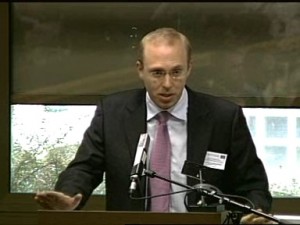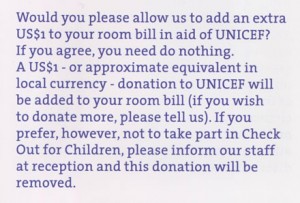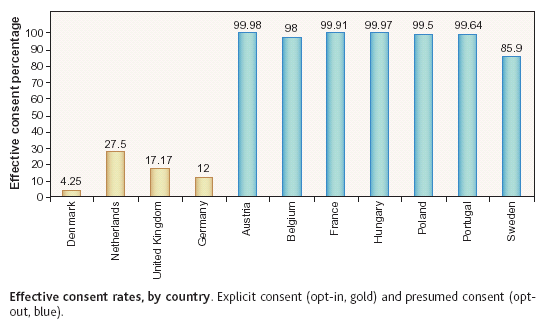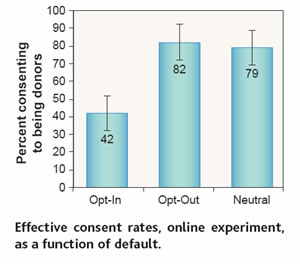DEFAULTS IN BRUSSELS

Last week, Decision Science News spoke at a European Commission conference on “How Can Behavioural Economics Improve Policies Affecting Consumers?“, which was terrifying, as it meant addressing a large room of people with name cards and microphones and simultaneous translators behind glass walls.
The DSN editor tried to emphasize how one must consider the cause of default effects when setting policies that govern which defaults should be prohibited, as discussed in a recent HBR article (Goldstein, Daniel G., Eric J. Johnson, Andreas Herrmann, and Mark Heitmann (2008).
Nudge Your Customers Toward Better Choices. Harvard Business Review, 86(12), 99-105.).

As he was checking into the Sheraton Brussels Airport Hotel, he received a brochure with his key card, stating that unless one opted out, a donation to UNICEF would be added to the hotel bill.
Would you please allow us to add an extra US $1 to your room bill in aid of UNICEF? If you agree, you need do nothing. A US $1 – or approximate equivalent in local currency – donation to UNICEF will be added to your room bill (if you wish to donate more, please tell us). If you prefer, however, not to take part in Check Out for Children, please inform our staff at reception and this donation will be removed
Since most people would probably not choose to make a charitable donation if asked, and since it inconveniences (and probably shames) people to stop by the reception to opt out, Decision Science News wonders if this is pushing things a bit too far. On the other hand, the program has raised $20 million so far …
FIREFOX USERS CAN HELP SET A WORLD RECORD
** NOTE: Please wait until the release time to download: 10 AM LA, 1PM New York, 6PM London, 7PM Paris **

What do browsers have to do with decision making? They are an excellent illustration of the power of defaults. The default home page within a browser is kept by vast numbers of users. The operating system’s default browser has, historically, has been adopted by most people. For this reason, the default browser and its settings exert an enormous influence over Web traffic, which translates rather directly into advertising revenue. And we’re not talking peanuts: Google earned $20 billion last year.
However, when a browser gets really good, it can overcome the odds and achieve widespread usage despite not being the default. FireFox is such a browser and for this reason is the official browser of Decision Science News.
Today, June 17th, 2008, marks the historic release of FireFox version 3. It can be downloaded for from the link at the bottom of this post. The source code is also free, if you’re a nerd and would like to modify it to suit your needs.
The good people at Mozilla are trying to set the world record for the most software downloads in a 24 hour period. If you like FireFox, today is your chance to help set that record, and download the new FireFox 3 today.
http://www.spreadfirefox.com/en-US/worldrecord/
ARE DEFAULT EFFECTS CAUSED BY PUBLIC IGNORANCE?

A debate on the Becker-Posner blog includes this hunch by Posner:
One possible reason the weak default rule appears to have a significant effect is public ignorance. The probability that one’s organs will be harvested for use in transplantation must be very slight–so slight that it doesn’t pay to think much about whether one wants to participate in such a program. When the consequences of making a “correct” decision are slight, ignorance is rational, and therefore one expects default rules to have their greatest effect on behavior when people are ignorant of the rule and therefore do not try to take advantage of the opportunity to opt out of it.
A search for some insight into this hunch takes us back to the very first Decision Science News post. The massive default effects found in the real world (pictured above), do not seem to be due to ignorance. The Science article by Eric Johnson and Dan Goldstein included a simple experiment in which people were asked to decide their organ donor status upon moving to a new state that either had an opt-in or an opt-out default.

The behavior in experiment mirrored that in the real world, and cannot be explained by ignorance or laziness: every participant read the policy immediately before deciding, and the only effort needed to change from the default was a mouse click. The cause of default effects is still something of a mystery, though DSN hopes to soon report a scoop on this topic.
 Subscribe to Decision Science News by Email (one email per week, easy unsubscribe)
Subscribe to Decision Science News by Email (one email per week, easy unsubscribe)






